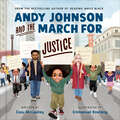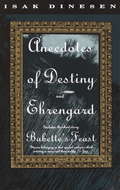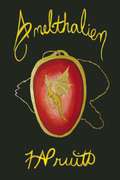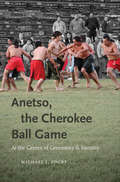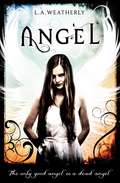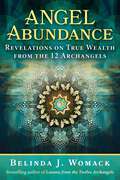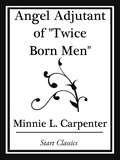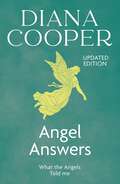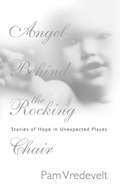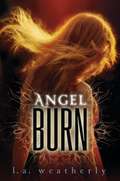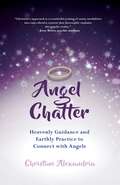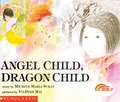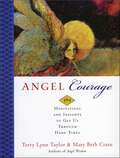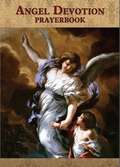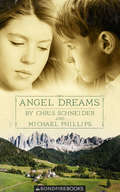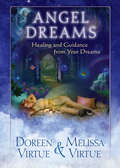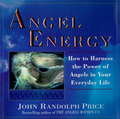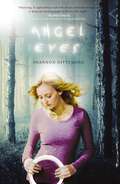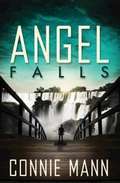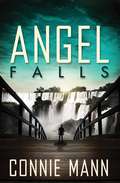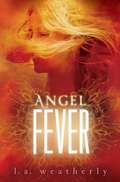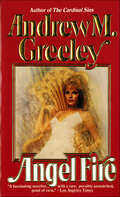- Table View
- List View
Andy Johnson and the March for Justice
by Esau McCaulleyFrom the bestselling author of Reading While Black comes a sweet and inspiring picture book that weaves together history and faith to help families talk about how everyone—including children—can be a voice for justice.Andy Johnson loves fighting battles. Especially when he has his favorite sword, the Destroyer, by his side. So when Dad announces that the Johnson family is heading to the city to join a march, Andy&’s ready to don his battle gear and be the best soldier!Except this isn&’t a march to war . . . it&’s a march for justice.Join Andy and the rest of the Johnson kids as they learn how we can answer God&’s call for justice and how marching is one way people can fight for a world that reflects God&’s love and compassion—from the civil rights era up to today.Building on the first Johnson family book, Josey Johnson&’s Hair and the Holy Spirit, and inspired by a conversation with his own children after taking them to a protest march, Esau McCaulley provides an accessible resource for parents and educators looking to engage kids on the topics of racism, discrimination, and social justice through a biblical and historical perspective.
Anecdotes of Destiny and Ehrengard
by Isak DinesenIn the classic "Babette's Feast," a mysterious Frenchwoman prepares a sumptuous feast for a gathering of religious ascetics and, in doing so, introduces them to the true essence of grace. In "The Immortal Story," a miserly old tea-trader living in Canton wishes for power and finds redemption as he turns an oft-told sailors' tale into reality for a young man and woman. And in the magnificent novella Ehrengard, Dinesen tells of the powerful yet restrained rapport between a noble Wagnerian beauty and a rakish artist.
Anelthalien
by H. A. PruittWhen Kindle discovers a necklace that transports her to a strange land called Anelthalien, all she wants is to return home. Soon, though, Kindle meets the strange yet kind Cifra and discovers that the necklace carries with it much more than a simple painting. After meeting three others who also find similar necklaces, the Cifra lead them to a farmer who also proves to hold many more secrets from times altered out of Anelthalien's memory. Once the farmer begins recalling the past and linking Kindle and the three others to it, Kindle realizes that returning home may not be as easy or as important as she believes. In fact, none of them expect the necklaces will tie them to not only an almost forgotten past but a gilded present and possibly disastrous future.Anelthalien provides an approachable, enchanting picture of the difficult, destructive problem of apathy toward God so that readers readily realize the problem does exist and that they must leave their preoccupations and misconceptions to follow God. From Anelthalien, readers will learn that tying yourself to God results in living out a purpose bigger and more important than yourself and also that followers of God must tell others about Him.
Anetso, the Cherokee Ball Game At the Center of Ceremony and Identity
by Michael J. ZogryAnetso, a centuries-old Cherokee ball game still played today, is a vigorous, sometimes violent activity that rewards speed, strength, and agility. At the same time, it is the focus of several linked ritual activities. Is it a sport? Is it a religious ritual? Could it possibly be both? Why has it lasted so long, surviving through centuries of upheaval and change? Based on his work in the field and in the archives, Michael J. Zogry argues that members of the Eastern Band of Cherokee Nation continue to perform selected aspects of their cultural identity by engaging in anetso, itself the hub of an extended ceremonial complex, or cycle. A precursor to lacrosse, anetso appears in all manner of Cherokee cultural narratives and has figured prominently in the written accounts of non-Cherokee observers for almost three hundred years. The anetso ceremonial complex incorporates a variety of activities which, taken together, complicate standard scholarly distinctions such as game versus ritual, public display versus private performance, and tradition versus innovation. Zogry's examination provides a striking opportunity for rethinking the understanding of ritual and performance as well as their relationship to cultural identity. It also offers a sharp reappraisal of scholarly discourse on the Cherokee religious system, with particular focus on the Eastern Band of Cherokee Nation. Anetso, a centuries-old Cherokee ball game still played today, is a vigorous, sometimes violent activity that rewards speed, strength, and agility. At the same time, it is the focus of several linked ritual activities. Is it a sport? Is it a religious ritual? Could it possibly be both? Why has it lasted so long, surviving through centuries of upheaval and change?
Angel
by Alton L. GanskyBack Cover Blending action and suspense with deep spiritual insights, Gansky creates memorable, thought-provoking tales. -STEVEN JAMES. author of the critically acclaimed thriller The Pawn Alton Gansky is a master of the speculative novel. When you place yourself behind the wheel of one of his novels, don't forget to buckle your seat belt. -ANGELA HUNT, author of Uncharted Gansky has the gift of riveting storyteller and consummate teacher. As you race through the pages, you're barely aware of the truths he's conveying until the ride is over. And the truths on this ride are worth paying attention to. An earthquake shakes Southern California, setting the stage for the appearance of Aster, a stranger from a world far from our own. Miracles happen around him, spectacular promises are made, and wisdom flows from his lips. He says he has come to complete our knowledge, to explain our beginnings, and to correct our spiritual errors. And the world is ready to receive him: politicians seek his advice, religious leaders wish to call him friend, scientists want to study him, and philosophers wish to debate him. But not everything is what it seems. This messenger seems too good to be believed. Priscilla Simms, an investigatory journalist is the only one close enough to the stranger to get at the truth. But unraveling the truth may cost her reputation, and maybe even her life. ALTON GANSKY is the author of twenty published novels and six nonfiction works. He has been a Christie Award finalist (A Ship Possessed) and an Angel Award winner (Terminal Justice). He holds a BA and MA in biblical studies and has served as senior pastor for three Baptist churches in California, with a total of over twenty years in pulpit ministry. He and his wife live in the High Desert area of Southern California.
Angel (Angels Trilogy #1)
by L. A. WeatherlyAlex is a ruthless assassin - of angels. Forget everything you've heard about them before. Angels are not benign celestial creatures, but fierce stalkers whose irresistible force allows them to feed off humans, draining them of their vitality until there is barely anything left. As far as Alex is concerned, the only good angel is a dead angel¿until he meets Willow. She may look like a normal teenager but Willow is no ordinary girl. Half-angel, half-human, Willow may hold the key to defeating the evil angels. But as the hunter and the hunted embark on an epic and dangerous journey and Willow learns the dark and terrifying secrets of her past, Alex finds himself drawn to Willow¿with devastating consequences.
Angel Abundance: Revelations on True Wealth from the 12 Archangels
by Belinda J. WomackAttract wealth and healing with the guidance of the 12 Archangels• Shares 63 healing visualizations to transform fear, resolve debt, and become receptive to the infinite bounty of the Universe• Learn how to tap in to the singing colors of the Central Sun that are mirrored in your chakras and raise your vibration to attract wealth—not only financial wealth, but anything you need to receive from Source to feel safe, happy, healthy, and free• Offers nighttime practices to support your transformation into a vessel to receive the full blessings of Source as well as advanced practices to transform sufferingYou are personally invited by the 12 Archangels to receive all that you desire from Source, especially the true happiness that often seems out of reach. Your Soul has the clear guidance and tools to help you move from lack to abundance and attract wealth and healing and the Archangels will show you how. Speaking through Belinda Womack, who has been a channel for the 12 Archangels for more than 30 years, the Angels explain that the root issue behind our lack of abundance is the fear of not enough. Sharing 64 healing visualizations, the Angels guide you to dissolve the deep subconscious layers of guilt and shame that keep you stuck in a fear-induced lack of wealth and become receptive to the infinite bounty of the Universe. Reading the visualizations from the 12 Archangels, with intention, helps you tap into the singing colors and undiluted love of the Central Sun mirrored in your chakras. The visualizations raise the vibration of your thoughts, feelings, and beliefs to attract wealth—not only financial gain but all that you need to receive from Source to feel safe, happy, healthy, and free. The 12 Archangels share lessons on the relationship between money and divine law, how to cultivate your garden of intuition and creativity, and how to resolve financial debt with understanding and love. They offer nighttime practices that support your transformation into a vessel to receive the full blessings of Source. They also offer advanced practices on harnessing your innate power to transform suffering. Helping you connect with the boundless care and &“deep pockets&” of your Soul to transform financial struggles and eliminate self-doubt, the 12 Archangels show that life keeps improving when you make room for the vast flow of creative genius and abundance coming from the Universe through the divine feminine.
Angel Adjutant of "Twice Born Men" (Start Classics)
by Minnie L. Carpenter"The Salvation Army has been happy in its Women Officers. The lessons of experience undoubtedly teach us that they are fully qualified for all the work of the ministry of Christ."
Angel Answers
by Diana CooperIn ANGEL INSPIRATION, Diana showed us how to tap into the awesome power of the angels. In ANGEL ANSWERS she brings us lessons from the angels advising us how we should live our lives in the bewildering modern world. From relationships with children or friends to illnesses, from understanding why some people become addicted to drugs or alcohol and how to alleviate their problems, to strategies for bringing about greater equality in the world, Diana covers a vast array of the biggest questions faced by humanity.Full of the wisdom and inspiration that she has gleaned over years of angel work, ANGEL ANSWERS is the book Diana's army of fans has been waiting for and is also the perfect introduction to her writing.
Angel Answers
by Diana CooperIn ANGEL INSPIRATION, Diana showed us how to tap into the awesome power of the angels. In ANGEL ANSWERS she brings us lessons from the angels advising us how we should live our lives in the bewildering modern world. From relationships with children or friends to illnesses, from understanding why some people become addicted to drugs or alcohol and how to alleviate their problems, to strategies for bringing about greater equality in the world, Diana covers a vast array of the biggest questions faced by humanity.Full of the wisdom and inspiration that she has gleaned over years of angel work, ANGEL ANSWERS is the book Diana's army of fans has been waiting for and is also the perfect introduction to her writing.
Angel Behind the Rocking Chair
by Pam VredeveltAfter the loss of her first baby and the birth of a fourth child with Down Syndrome, Pam Vredevelt felt that she had fallen from God's grasp. As she was soon to discover, however, God was just beginning to hold her tight and lead the way out of her endless pit of despair. With humor and touching insight, Pam unveils her struggle to emerge from darkness into the light in this paperback release of her popular work. Many have been touched by the same anguish; Pam shares their stories and how the supernatural touch of God sustained them through the darkest days of life.From the Trade Paperback edition.
Angel Burn
by L. A. WeatherlyIn a world where angels are not benign celestial creatures, but fierce stalkers whose irresistible force allows them to feed off humans, draining them of their vitality, a ruthless teenaged assassin of angels falls in love with a half-angel, half-human girl, with devastating consequences.
Angel Chatter: Heavenly Guidance and Earthly Practice to Connect with Angels
by Christine AlexandriaWhatever faith we personally subscribe to, angels cross those boundaries and find their way into our lives. They remind us that we are not alone; that we are all guided and protected from another world. In her new informative, quirky, and practical guide, angel intuitive and award-winning author Christine Alexandria shares her profound gifts and vast knowledge of angels.Christine details how to strengthen our connection and become empowered by the fourteen archangels with whom she chats. Chapters include the therapeutic role of each angel, the chakra system and crystals affiliated with them, guided meditations, and more. Angel Chatter enables people from all traditions and faith backgrounds to access the wisdom, joy, and power of Christine’s “haloed gang.” The angels “will flock to assist us”—this is their simple yet solemn promise.
Angel Child, Dragon Child
by Michele M. SuratUt comes to America from Vietnam, but her mother must stay behind due to a shortage of funds. Ut's struggle to adjust to her new life is worsened by insensitive classmates. In a heartwarming ending, the students run a fair and raise the money for Ut's mother to join her family. Full color. A Notable Children's Trade Book in the Field of Social Studies; Booklist Editors' Choice.
Angel Courage: 365 Meditations and Insights to Get Us Through Hard Times
by Mary Beth Crain Terry Lynn TaylorFrom the authors of the bestselling Angel Wisdom comes a book for everyone who wants to transform fear into courage and despair into hope. This delightful book shows us how to learn from our experiences and live every day with the grace and joy of the angels. With a year's worth of daily meditations, Angel Courage offers fresh wisdom for confronting life's difficulties, both large and small-from stress at work to quarrels and letdowns, guilt and regrets, grief and grudges. Each day's reading features a thought-provoking quote, ideas for reflection, exercises, and an inspiring angel blessing. The authors encourage us to learn to love ourselves no matter what mistakes we've made. "May you always make mistakes," they advise, "just not the same ones." The wisdom of the angels shows us how to laugh at ourselves, live in the moment, put our energy into productive activities, and follow the timing of our hearts by using our own angel courage to greet each day with authenticity and love.
Angel Devotion Prayerbook
by Luis ValverdeA collection of a variety of prayers, litanies, chaplets, novenas, and other devotions to Saint Michael, Saint Gabriel, Saint Raphael, and Our Guardian Angel, compiled by Luis Valverde and accompanied by magnificent classical images of each of the four angels. These prayers are meant for both individual and groups and can be used in many situations and for many purposes.
Angel Dogs: Divine Messengers of Love
by Linda Anderson Allen AndersonReading Angel Dogs: Divine Messengers of Love is like taking a walk in the park on a sunny day with your favorite dog. This wonderful collection of stories will bring back memories of the sweet, delightful, and touching times you have spent with your own loyal canine friends.
Angel Dreams
by Michael Phillips Chris Schneider&“A new story to immerse yourself in this Christmas season—a story that inspires your faith, beckons to your imagination, and tugs on your heartstrings.&” —Prairie Sky Book Reviews Reality and fantasy converge in this wonder-filled tale, beautifully crafted by authors Chris Schneider and Michael Phillips. A grieving World War II widow in search of a long-lost daughter finds herself drawn to a small Wyoming town. A crippled and mute orphan boy has a wondrous dream every Christmas Eve where he walks, talks, sees his mother, and meets a mysterious girl who becomes his best friend. &“Being filled with occurrences that could only come from Above, as well as Heavenly dreams and mysterious angel encounters, this story will continue to surprise readers until the very end. The setting of a small, post-WWII town, various secondary characters who add color and depth, and the back-and-forth timeline of events increases the one-of-a-kind feeling of the book, but in a special way makes it more endearing, as well.&”—Prairie Sky Book Reviews
Angel Dreams: Healing And Guidance From Your Dreams
by Doreen Virtue Melissa VirtueDreams are gateways to other worlds, times, and planes of existence. They are sacred portals through which we receive powerful messages from Source, often in the form of symbols brought to us by our dream guide and the angels. <P><P>In this book, Doreen Virtue and Melissa Virtue discuss where dreams come from, how to interpret them, what role angels play, and whom to call upon for guidance. You'll gain tools to enhance your dreamtime journeys, including techniques for creating your own dreams and improving your recall upon awakening. In addition, you'll learn to identify the different types of dreams by reading personal stories and interpretations that will help you decode your dream messages.
Angel Energy
by John Randolph PriceThe natural expression of the angels is Truth. If we deny the truth, we repress the energy of the angels. But when we fully accept the eternal verities of life, the angels go to work to bring everything up to the divine standard....Within each one of us dwell the twenty-two angels, centers of Living Energy that provide us with all we need to sustain us on our journey through life. They await only our readiness.However, the angels require our assistance to manifest changes in our lives. They are able to free us from disease and death, loneliness and unfulfillment, lack and limitation only when we free them. And so the author of the bestselling The Angels Within Us has written this book to help us set free the positive vibrations of these inner archetypes and their "nothing-is-impossible" energy.Through meditations, affirmations, exercises, dialogues with the twenty-two angels, and true stories of the miracles and transformations wrought by them, he helps us liberate the power of the Divine within so that we can: * Awaken our higher consciousness* Heal the past* Communicate with angels awake and dreaming* Find our right livelihood* Enjoy prosperity* Open ourselves to physical healing* Find fulfillment in our relationships* Surrender to unconditional love* And much moreOur angels are the very law of our being. This remarkable book helps us to connect and flow with their universal rhythm of wholeness, to become who and what we really are.From the Trade Paperback edition.
Angel Eyes (An Angel Eyes Novel #1)
by Shannon DittemoreOnce you've seen, you can't unsee.Brielle went to the city to chase her dreams and found tragedy instead. She's come home to shabby little Stratus, Oregon, to live with her grief and her guilt . . . and an incredible, numbing cold she can't seem to shake.Jake's the new guy at school. The boy next door with burning hands and an unbelievable gift that targets him for corruption.Something more than fate has brought them together. An evil bigger than both of them lurks in the shadows nearby, hiding in plain sight. Two angels stand guard, unsure what's going to happen. And a beauty brighter than either Brielle or Jake has ever seen is calling them to join the battle in a realm where all human choices begin.A realm that only angels and demons--and Brielle--can perceive.
Angel Falls
by Connie MannWhen her best friend is killed in an explosion, leaving Regina da Silva with her friend's young child, she doesn't realize that the child was as much a target as her friend. Brooks Anderson has been sent to find the child and bring it to the US. When circumstances bring them together in Brazil, they find themselves being pursued by a killer as they protect an orphaned babyAs the danger heightens around them, so does the attraction between Regina and Brooks, despite their differences. Regina and Brooks have both been broken by their violent pasts, but while Regina relies on her faith to deal with her past, Brooks has turned away from God. Will their pasts stop them from realizing their true feelings for each other when their pursuer strives to keep them apart forever?
Angel Falls
by Connie MannWhen her best friend is killed in an explosion, leaving Regina da Silva with her friend's young child, she doesn't realize that the child was as much a target as her friend. Brooks Anderson has been sent to find the child and bring it to the US. When circumstances bring them together in Brazil, they find themselves being pursued by a killer as they protect an orphaned baby. As the danger heightens around them, so does the attraction between Regina and Brooks, despite their differences. Regina and Brooks have both been broken by their violent pasts, but while Regina relies on her faith to deal with her past, Brooks has turned away from God. Will their pasts stop them from realizing their true feelings for each other when their pursuer strives to keep them apart forever?
Angel Fever
by L. A. WeatherlyAs half-angel Willow strives to save the world from her parasitic otherworldly kin, romance and tension heat up to a climactic finale. In the devastated remains of the world, millions of people live in "Edens" provided by the angels who have all but enslaved humanity. As the angelic stranglehold on humanity tightens, Willow and Alex are recruiting and training new Angel Killers while struggling to hold ground on the celestial battlefield. Willow continues to struggle with feelings for Seb, and her love and resolve are tested as a shattering revelation sends Alex on a separate journey. Now that the final battle versus the angels is about to begin -- and the fate of the world hangs in the balance -- each of them must face the consequences of their own choices. Will love endure? Will the human race survive?
Angel Fire
by Andrew M. GreeleySomeone to watch over me? Sean Seamus Desmond, newly-announced Nobel Prize winner, relishes the unknowns of science, but a real-life mystery of love and passion. . . in the form of a beautiful woman who says she's his guardian angel? Impossible. Yet there in his New York hotel room is an enchanting creature named Gabriella Light, who inexplicably and dramatically has just saved his life.Voluptuous and exquisitely dressed, sexy Gabriella, angel or not, is determined to keep him alive as a terrifying web of intrigue closes around him. Pursued by a very real and present danger, Sean Desmond will question his own sanity and his deepest beliefs, as he experiences what cannot be rationalized away as anything other than a powerful, radiant, and transcendent love. . . one that will test him as a man too long afraid of human and divine fires within himself!A wonderful, electrifying novel, Angel Fire, will delight readers with the storytelling magic that Andrew Greeley does best. Again he has created a tale rich with suspense, breathless entertainment, compelling ideas--and fascinating charaters we love, cherish, and never forget.At the Publisher's request, this title is being sold without Digital Rights Management Software (DRM) applied.
